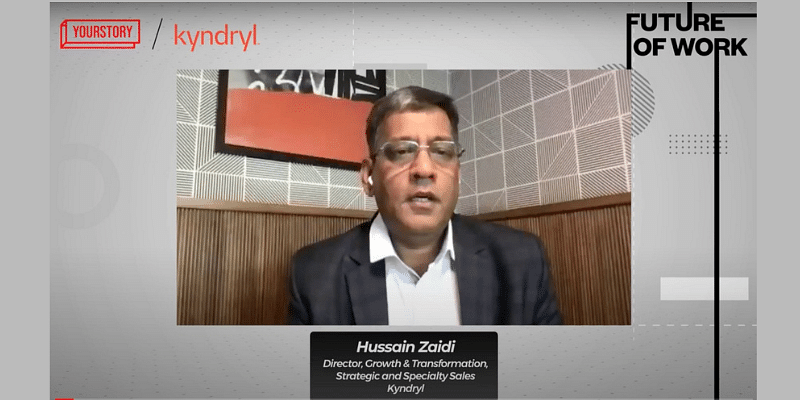“In today’s digital era, it is going to be amazing as we bring a lot of new dimensions and ideas on the future of work, in collaboration with technology,” said Hussain Zaidi, Director, Growth & Transformation, Strategic and Specialty Sales, Kyndryl, while speaking about ‘Fuelling the future with equitable work experiences’ at YourStory’s Future of Work Summit 2022.
As agile business models become the go-to strategy for any business to succeed, creating wholesome work cultures are becoming crucial to ensure employees cultivate a growth-oriented mindset. Opportunities to thrive, sense of purpose and belongingness, personalised experience, and collaboration of technology and workforce are some elements that are taking centre stage as leaders look to strengthen the future of their organisations.
Hussain spoke about the factors and solutions that will act as fixtures for employees as businesses move towards a hybrid and inclusive work culture, while chasing growth and resilience.
Redesigning business processes and operations
Speaking about the trend of adopting flexibility and modernisation of the workplace, Hussain highlighted the “importance of creating a work environment that encourages an experience-driven culture”.
“Employers have recognised the need for thoughtful and compassionate outlook towards both the work and the workforce, making way for a newer style of working that fosters a sense of wellbeing and inclusion,” he added.
Hussain further elaborated on the inherent shift in work cultures across the world as wellbeing and health of employees become an integral value for organisations, thereby enabling them to enjoy a personalised experience and seamless access to information and tools they need to perform their jobs effectively.
“Regardless of an employee working from a conference table, an office or dining table, through a laptop or through a mobile phone, the company’s digital workplace environment should be able to deliver an equitable work experience to them with no disruption to the business,” said Hussain, stressing on creating digital workplaces that take into account employee’s work pattern history, profile, roles and responsibilities, expertise, device location, and other parameters.
Designing a futuristic workplace
Architectures will shift around aspects such as video conferencing platforms, security, mobility, and other collaborative tools. Organisations will also need to expand, according to the new workforce models such as contract workers, freelancers, hybrid workers, and more.
“Infusion of AI is critical as it empowers employees to be autonomous. They will have the ability to take better and faster decisions, resolve some problems at their own level, and collaborate with colleagues in a faster, more efficient manner,” he said, sharing anecdotes of self help chat bots, self setup digital assistants that can enable employees to handle their work environment better when they are connecting from home.
Keeping the security and privacy aspects in mind, Hussain pointed out that employees should feel safe and secure while working remotely. Organisations will need to think about ways to eliminate concerns such as data encryption, cybersecurity, etc as employees gear up for the ‘working from anywhere’ culture.
Another important area of concern is understanding and adopting positive, proactive and adaptive support services such as deployment management, zero touch omnichannel services, on-site support, cloud based collaboration tools, desktop virtualisation, workflow orchestration through automation, and more.
“Employees today should seek if their organisations have a visual workplace strategy or a strategy to measure holistic digital experience. You should also understand if you have a visibility of the current state of productivity of your workforce. It is also important to understand the total cost of ownership and return on investment that your organisation is looking at while building for the new hybrid and equitable workforce,” said Hussain, concluding his keynote address.



![Read more about the article [Funding alert] Healthcare robotics startup Comofi Medtech raises Rs 2.15 Cr in seed round led by JITO Angel N](https://blog.digitalsevaa.com/wp-content/uploads/2021/04/Imagetqe7-1619519266921-300x150.jpg)





![Read more about the article [Funding alert] Food startup Snack Amor raises pre-Series A round](https://blog.digitalsevaa.com/wp-content/uploads/2021/08/Imagecboy-1629354732330-300x150.jpg)
